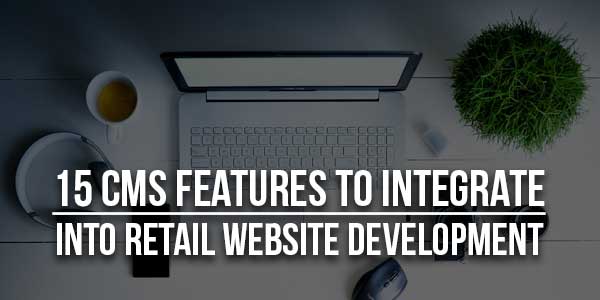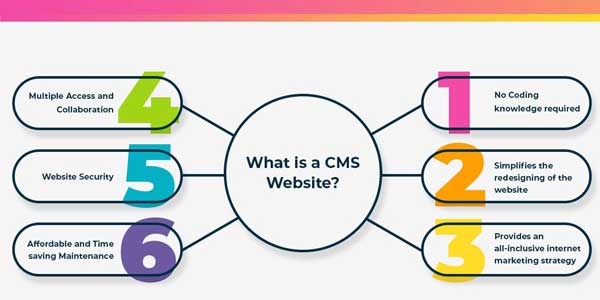
Did you know building a website is as easy as creating a social media account? It is only possible with an efficient CMS. you just need to drag and drop from the selected CMS store. Millions of websites are created using different CMS. WordPress is the most popular. Even though websites are built using the CMS, they have a unique touch to it.
In 2018, the market share of CMS was about $35.9 billion globally. Fast forward to 2026, and it is expected to reach $123.5 billion by the end of 2025. So, if you are planning to build your retail website, hire a web development company and ask to build it using a CMS. Make sure to communicate your requirements.
Table of Contents
What Are The Types Of Content Management Systems?
There are 5 types of CMS that you can choose from.
- Digital Asset Management System
- Web Content Management System
- Document Management System
- Enterprise content management system
- Component content management system
Let’s not make the context broad and focus on the features you should consider in a CMS. Here are the top 15 features of the CMS that you should choose for your online retail business.
What Are The 15 CMS Key Features?
Strong Community:
When experimenting with a new CMS platform, sooner or later, you will need support. Thus make sure that you have easy access to the community support of the CMS. In case you face any challenges, you can reach out to the team.
Moreover, members share plugins, extensions, or themes they have discovered. It will allow CMS web developers to add custom functionalities.
Robust Security:
Do you want to expose your user and business data? You would definitely want to avoid that happening. Isn’t it? So, look for the security standards and guidelines the selected CMS offer. Check whether it follows TLS/SSL encryption or not. Such encryption ensures that the transmitted data between the website and its users is encrypted. Hence, it makes it harder for malicious actors to intercept sensitive information.
Multilingual Support:
Here, check if the CMS supports Multilingual content delivery. It allows website owners to manage content in multiple languages. This way, you can make your websites more inclusive to a global audience.
This feature positively drives SEO efforts. When users search for content in their native language, they look for a website that supports multi-language. It increases the likelihood of the website appearing in search results.
SEO Tools And Extensions:
SEO is the most vital aspect of digital marketing. It significantly impacts a website’s organic traffic and visibility. Several CMS offer useful SEO extensions or built-in tools. Look for those CMS. It will help you optimize your content and improve its rankings on search engines. Such platforms allow users to set custom SEO titles and meta descriptions.
User-Friendly Dashboards:
A user-friendly dashboard located at the backend of a website influences the user experience and simplifies site management for website administrators and owners.
Popular CMS platforms like WordPress, Drupal, and Joomla offer user-friendly backend dashboards. Such a dashboard consolidates data and insights, simplifying website optimization.
Mobile-Friendly Templates:
Google uses a method known as mobile-first indexing. It determines the ranking of web pages. When ranking your pages in search engine results, the search engine checks if it is friendly for mobile sites. In this scenario, a website with mobile-friendly themes can rank at the top.
You will lose potential visitors if your website is difficult to access on a smartphone. Also, it will affect your web page ranking. Therefore, go for the CMS that provides mobile-friendly themes.
Easy Integration Support:
Integration capabilities are at the core of CMS. It allows website owners to enhance their website’s functionalities, making it more dynamic. You can also refer to it as plugins. It facilitates seamless connections with different payment gateways, software, data sources, and shipping solutions. Hence, choose a CMS platform that is open-source.
Did you know WordPress supports more than 59,000 plugin options?
Through plugins, users can integrate external services directly into their main CMS dashboard.
Content Publishing And Editing Tools:
A web development company ensures that the CMS they choose has content scheduling systems and publishing tools. It must also include WYSIWYG content editors. Suh functionalities make it easier for users to update and manage website content. For this, they don’t need to code. A WYSIWYG content editor allows you to frame and structure content in a visually appealing way. This is similar to using software like Google Docs.
Inventory Management:
Inventory management as a CMS feature is about tracking, controlling, and managing the stock of products in an online store. So, when you choose a CMS, ensure that it has a centralized database to store product-related information. It provides real-time updates to users on stock shortages. Or it adjusts the stock levels in real time.
Automation For Email Marketing:
A modern e-commerce CMS allows business owners to expand the lists of their email subscribers. It automatically sends personalized email campaigns to potential customers interested in the specified products or services. So, choosing such a CMS will be your asset, especially in the retail segment.
For instance, when customers leave the shopping carts without any purchasing action, these CMSs send reminder emails. These emails notify potential shoppers about the items left. It also sends them exciting offers motivating them to finalize their purchases.
Analytics Integration:
The feature of analytics integration in a CMS is valuable. It allows seamless bonding with tools like Google Analytics. This integration offers in-depth analysis and insights into the retail website.
Buttons For Social Sharing:
For an online retail business, social media channels are the most powerful marketing platform. So, when you select a CMS, look if the social sharing buttons are available on the CMS platform. If it doesn’t have this feature, don’t mind replacing it with other CMSs.
Some CMS platforms may charge you added fees to activate this feature.
Abilities For Canonical Link Markup:
Integrating canonical link markup is required if your retail store offers multi-variant goods. Each product variant has a definite URL. It is beneficial for buyers as they can access their preferred product.
If your CMS does not have this feature, SEO measures may get diluted as backlinks are divided among variant pages. In this regard, the canonical link markup allows you to specify a page’s basic version to search engines.
Product Recommendations:
In the online retail segment, a separate product recommendation section enhances the average order value. It eventually boosts the shoppers’ satisfaction.
The consideration of this feature has been regarded as a revenue-boosting mechanism. It is evident among online retail giants such as Amazon, Zappos, and eBay. So, ensure that your CMS provides this feature.
Seamless Control For Page URL:
Page URLs are necessary for deciding the search engine ranking. URLs that incorporate relevant keywords carry more weightage in search engine rankings. So, selecting an SEO-friendly CMS is much more preferable.
Final Thoughts:
Building a website with the modern CMS platform is okay but what if it does not support the feature that you want for your online retail business. It won’t be of any use. So, before going with any specific CMS platform, checking its features is a smart strategy.

 About the Author:
About the Author:
















I enjoy reading your blog! Thank you for writing amazing post. Excellent and appreciative blog. Continue to update.
Welcome here and thanks for reading our article and sharing your view. This will be very helpful to us to let us motivate to provide you with more awesome and valuable content from a different mind. Thanks again.